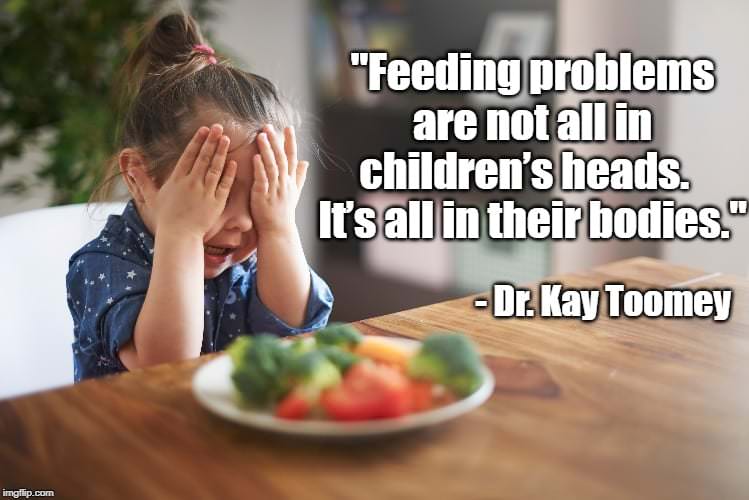 ☰ Menu
☰ Menu
 ☰ Menu
☰ Menu
In my role as a Pediatric Psychologist, Pediatric Feeding Specialist and Developer of the SOS Approach to Feeding, I have heard this “myth” being reported frequently by well-meaning professionals trying to convince parents that they do not need to be worried about their child’s eating habits. However, it is not true that all children are picky. Nor is it true that they will all outgrow it. The research in the field of Feeding Disorders actually shows that on average, only 20-30% of children will struggle with some type of feeding challenge or picky eating at some point within their first 5-6 years of life. In addition, the data indicates only about one-third to one-half of these children will actually just “outgrow” their feeding difficulties without some type of intervention (see the summary of the major research studies summaries). When you look at the statistics over time, about 50% of children with picky eating challenges continue to struggle with not eating a wide enough range of foods well into their grade school years and beyond.
 It is also interesting to note that these statistics are the same regardless of the child’s country of origin, culture and/or parenting practices. I have been privileged to teach the SOS Approach to Feeding program both nationally and internationally and can attest to seeing the same types of feeding issues occurring in children across the entire world. I believe that we find similar feeding/eating challenges around the world, regardless of what culture a child lives in because feeding difficulties are about how the human body does or does not work correctly. My 30 years of clinical experience in assessing and treating Feeding Disorders has taught me that feeding problems are not all in children’s heads. It’s all in their bodies. When a child doesn’t eat, we need to look for the skill deficits, developmental challenges and physical problems underlying this child’s difficulty with eating or feeding well. We should not be blaming parents or saying that a child has a behavioral feeding problem.
It is also interesting to note that these statistics are the same regardless of the child’s country of origin, culture and/or parenting practices. I have been privileged to teach the SOS Approach to Feeding program both nationally and internationally and can attest to seeing the same types of feeding issues occurring in children across the entire world. I believe that we find similar feeding/eating challenges around the world, regardless of what culture a child lives in because feeding difficulties are about how the human body does or does not work correctly. My 30 years of clinical experience in assessing and treating Feeding Disorders has taught me that feeding problems are not all in children’s heads. It’s all in their bodies. When a child doesn’t eat, we need to look for the skill deficits, developmental challenges and physical problems underlying this child’s difficulty with eating or feeding well. We should not be blaming parents or saying that a child has a behavioral feeding problem.
In the SOS Approach to Feeding program, we assess and address the 7 areas of human functioning that are involved in the process of learning to eat well: organ systems; motor & oral motor abilities; sensory processing; learning history/style/capacity, development, nutrition, and environmental factors. We identify what about this child’s body is not working correctly for them to gain the skills they need to eat a wide variety of nutritious foods in the right volumes to grow well. Then, we teach children and their families, the skills the child needs through “play with a purpose” of moving them up a series of 32 Steps to Eating.
Because of the research which shows that at least half of the children with feeding problems will continue to struggle with being able to eat well, I encourage all families not to wait to seek out help for their child – even if you think it is “just picky eating”. The earlier families can get their child into feeding treatment, the more likely their child’s issues can be fully resolved. Ideally, children will enter into therapy before 3 years of age if they are struggling to eat well.
Additionally, you can search and find an SOS trained feeding therapist in your area to assess your child’s skills and help get back on the road to happy mealtimes.
Copyright SOS Approach to Feeding © 2024 | Web Design by Webolutions